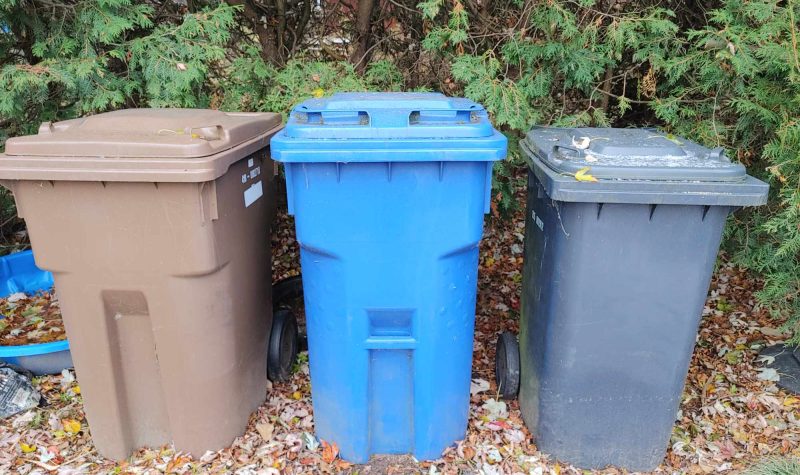The Municipal Regional County (MRC) of Brome-Missisquoi has revised its Residual Materials Management Plan (RMMP) and it has now been officially implemented across the MRC.
Under the Quebec provincial government’s Environment Quality Act, which implements strategies, actions plans, and policies for waste management in the province, all MRCs are required to revise their RMMP every seven years, explained Oriana Familiar, environmental management service coordinator for the MRC of Brome-Missisquoi.
As a result, the MRC of Brome-Missisquoi carried out a thorough consultation process over the last two years to update the RMMP, which included two public surveys, a public consultation, and a multi-sector workshop.
“We really wanted to address the population and all the issues and difficulties that the population has to better manage their waste. So we did several initiatives. For example, we did focus groups with key stakeholders, such as municipalities, elected officials, municipal workers, companies, citizens that are very involved - like green citizen committees,” explained Familiar.
The 2023-2030 RMMP was officially created through this consultative process. There are a number of objectives and targets that the MRC has set out in the revised RMMP as a tool to help better manage waste materials in Brome-Missisquoi and to limit the production of waste over the next seven years.
“We are producing a lot of waste and we need to do something. It’s not only Brome-Missisquoi, it’s every MRC in Quebec. In the era of climate change, it does make a difference in terms of green house gases. (…) I think it’s a very direct way of helping. Sometimes we see climate change and it can gives us anxiety in terms of there’s nothing I can do -- if there is a flood, there is nothing I can do, if there’s a heat wave, how can I prevent that? But we can prevent the waste that we make,” said Familiar.
One of the key objectives in the new RMMP is to provide more education on waste management to people living and working in the region.
“There are so many materials, there are so many types of waste. Even if we [talk about] recycling, there are different types of plastic, there are different types of fibres, glass comes in different colours, so people get so confused. Do I need to wash them? Rinse them? Do I need to remove the label? That was one of the major issues with the population. They were asking for more education,” highlighted Familiar. “We come back every once in a while, do reviews, ... remind them what to do because it’s not easy.” One of the challenges, she noted, is that industry changes really fast. “Products that didn’t exist six months ago today, they exist, and the producers, unfortunately, did not necessarily address the end-of-life of the product,” she explained.
Familiar noted that educating and helping the industries in the region is a top priority in the new RMMP as they “are the ones that create the huge volumes that we see.”
“In general, the [objective] is to better educate at all levels. It’s not only how to better recycle or to better compost, but there are steps that you can [take] to reduce before you create more waste - changing your lifestyle for example,” she said.
According to Familiar, the other major concern for the MRC is the build-up of construction, renovation, and demolition materials (CRD) in the regional landfill and how to divert these materials elsewhere.
“There’s not many options on how to recycle them .... We need to address this issue in particular because (…) when we pulled out the statistics to see where we were placed in comparison to other MRCs, Brome-Missisquoi came in second place as a producer for CRD materials per resident,” said Familiar.
In terms of numbers, the MRC aims to recycle and recover 70% of CRD materials by 2029, recycle 75% of paper, cardboard, glass, plastic and metal by 2030, and recycle or recover 70% of organic waste by 2029.
One of the ways the MRC hopes to accomplish this is by ensuring that citizens and industries have access to waste management services. This includes providing recycling bins and compost bins, and working with Brome-Missisquoi municipalities to change waste collection in the region, according to Familiar.
“The MRC does not legally have the power to manage all of the waste collections in the 21 municipalities. As of now, each one of the 21 municipalities in Brome-Missisquoi decide what to do with their waste and how to do it. (…) This a big challenge because that means we have 21 different ways of collecting. One of our targets is to harmonize and unify the way we do waste everywhere Brome-Missisquoi,” she explained.
Now that the 2023-2030 RMMP has been officially implemented, Familiar emphasized that all stakeholders need to work together to ensure the plans success.
“The MRC cannot do everything. We don’t have the capacity either. We need the partners, absolutely, so that this works. That would be the next step eventually, probably next year. We plan on doing a huge campaign and just visit all the municipalities, the partners, the stakeholders so they get to know this plan better and how they can individually make a difference,” highlighted Familiar.
For more information on the RMMP, listen to the full interview below:


